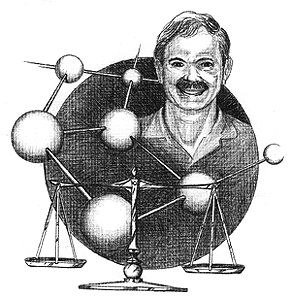



By Roger N. Perry Jr. '45
"When I entered WPI in 1971, I already knew I wanted to become a lawyer," says Jon Anderson of Montpelier, Vt. Now a partner in one of the 10 largest law firms in the state, Anderson was in the first class of freshmen to study under the WPI Plan.
Anderson says it was the Plan and his interest in studying engineering that drew him to WPI. "I interviewed several lawyers who said that every engineer they'd ever known who'd gone on to law school was a darned good lawyer. My parents also liked the idea of my having an engineering background, and my brother graduated in the Class of 1968. My dad, a guidance counselor, had heard about some interesting curriculum changes WPI was making. We came for a visit and I liked what I saw.

"I don't think I would have gone to -- or stayed at -- WPI but for the Plan. It was the way I wanted to learn. As time has gone by, I realize that I learn differently from other people. I learn by immersing myself in something, not really understanding it very well at first. Then I put it all together. The Plan seemed tailor-made for me."
Anderson majored in chemical engineering and used his projects to develop his knowledge of the law. "I did my IQP on the Watergate hearings, watching just about every hour of the proceedings on television," he says. "It was great for a future lawyer to see government trying to regulate a technical issue, in this case the wiretapping law, and then hearing people talk about why they thought their personal ethics entitled them to step outside the law."
He explored the relationship between U.S. and Russian foreign policy for his Sufficiency. "I'll always remember my advisor, Professor John Zeugner, saying, 'With your grades, people will understand that you know what you are doing as far as science goes. We need to do something that tells people you understand history and the humanities.'"
As a result of that discussion, Anderson published a paper, "Royall Tyler's Reaction to Slavery in the South," in Vermont History. He informed every law school to which he'd applied about the publication. He says he likes to think the article played a role in his acceptance to Yale Law School, his first choice. While a law student, he published a note in the Columbia Journal of Environmental Law on the 1976 ruling by Department of Transportation Secretary William Coleman to allow the Concorde to land in the United States despite concerns about potential harmful effects on the ozone layer. He says he used his engineering background to evaluate the scientific data that had supported that decision. "Without my WPI education, I would have had no way of understanding all this," he says.
After law school, Anderson was accepted as a law clerk by a highly respected federal judge in Wilmington, Del. "During my two years as his clerk," he says, "the judge decided several particularly noteworthy cases involving chemical compounds, including the patent for crystallized polypropylene. Needless to say, this challenged my WPI background."
After that experience, he joined a Vermont law firm that wanted him to do public utility work. This later led to a position with the Vermont Public Service Department, where he represented rate payers in public hearings. "In 1985, Mike Burak, a former colleague at the PSB, invited me to join him," he says. "Initially, we were affiliated with a firm in Boston, but in 1990 we separated from them and recapitalized, forming Burak and Anderson. We now have nine lawyers. That may not seem large by big city standards, but in Vermont that's a large firm." Anderson specializes in environmental law.
"Starting a firm and building a practice from scratch is not something you learn in law school," he says. "I had to read a lot about the business of law, especially marketing, and approach it just as I did projects back at WPI."
Anderson has played a role in the political life of Vermont. He served as interim legal counsel to Governor Madeleine Kunin and for eight years was an elected alderman in Montpelier. He also served, by gubernatorial appointment, as the chairmen of Vermont's Blue Ribbon Task Force on Hazardous Waste. Today he is chairman of the Vermont Bar Association's Environmental Law Committee, chairman of Montpelier's Travel Information Council, and a member of the board of the Central Vermont Chamber of Commerce.
Anderson's wife, Betsy, was deputy tax commissioner under Governor Kunin. When it became clear that a new governor would bring in his own staff, he and Betsy decided to create a business she could run from home. "We started Betsy's Bed & Breakfast in a house we bought in Montpelier," he says. "We opened with three rooms and we now have eight, with space to go up to 10 or 12.
"When we first saw the building, it needed extensive renovation. I really like historic preservation, and if I'd been anything but a lawyer, I probably would have been an architect. I did the general contracting and I put in some sweat equity, too. Not only did I learn about home building in WPI's first Intersession, when I took Professor Ray Hagglund's short course, but opening the B&B was really another project. Once again, WPI's project-based education taught me how to learn."